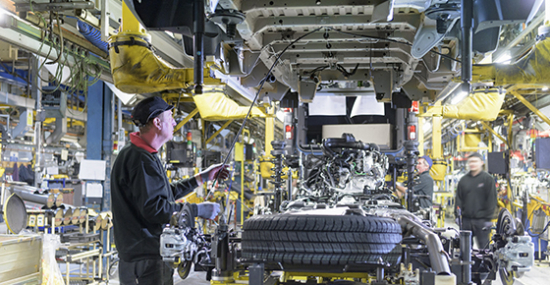CV output figures up 92.9 per cent, but industry worried about rising costs
 UK vehicle production figures for August, released by the Society of Motor Manufacturers and Traders (SMMT), were generally extremely positive, although concerns were voiced about forthcoming economic developments (Photo: SMMT)
UK vehicle production figures for August, released by the Society of Motor Manufacturers and Traders (SMMT), were generally extremely positive, although concerns were voiced about forthcoming economic developments (Photo: SMMT)
In the commercial vehicle (CV) sector, production rose 92.9 per cent to 6,132 units, according to the latest SMMT figures, marking the best August since 2012 and the eighth consecutive month of growth. Overseas demand was up 78.4 per cent, while production for UK operators more than doubled year-on-year, rising 119.3 per cent. Year-to-date CV output is up 50.3 per cent at 64,828 units in the best year-to-date since 2012.
There was good news too on the car side, where production rose 34.0 per cent in August to 49,901 units after what the SMMT describes as ’a dismal 2021’, but volumes are still -45.9 per cent down on pre-pandemic levels. A fourth consecutive month of growth failed to offset sustained losses from global supply shortages, with YTD output more than half a million units behind average pre-Covid volumes. The sector welcomed the business energy price cap, with bills already up by £100 million this year, but warns of a spring cliff-edge as seven in 10 firms expressed concern about future business operations.
An example of this cautious approach came from David Leggett, Automotive Analyst at data and analytics company GlobalData, who said that the UK automotive sector still faces testing times ahead, despite output gain in August.
Says Leggett: “The growth trend of recent months is welcome, but it comes against a very depleted base with output in Britain still running at almost half the level it was before the pandemic. The UK’s automotive industry faces big competitive challenges ahead.
“While manufacturers are still in the position of fulfilling order backlogs under long waiting times caused by an unprecedented shortage of critical parts this year, underlying demand prospects are deteriorating.
“UK government measures to mitigate the impact of imminent soaring energy costs this winter are welcome, of course, but higher energy bills and other cost pressures are emerging as a major worry throughout the supply chain when companies look to prospects for next year and beyond.
“Furthermore, lower economic growth and weaker car demand in the UK and in major export markets, will make it very difficult for car companies and their suppliers to pass on higher manufacturing costs to their customers.”


 Exol
Exol
Comments